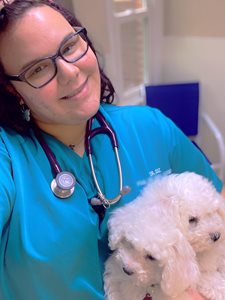Essential Work
I never knew that the phone would be my armor. When COVID-19 precautions started, I was convinced that the clinic I worked at would close. I didn’t understand how being a private practice veterinarian in Maryland could be essential.
Then I thought about it: I give vaccines to prevent fatal diseases; I treat everything from upset tummies to grotesque wounds; I manage chronic illnesses. I save lives. I end suffering. How could I have thought that my work was not essential?
I later realized that I was just terrified. Terrified of having to go to work every day during a pandemic. Terrified of having to deal with the public that might pass their cough off as “just a tickle” in their throat. Terrified because I have MS, and I’m an essential worker. Face masks and social distancing aside, I feel like I need bubble wrap around my immune system for the foreseeable future. Part of my fear is the mass fear of the world, and part of it is probably me being overly cautious, but I can only get the same office-wide cold so many times before it starts to sink in that my immune system isn’t up to snuff.

It’s safer that way right now.
But I hate it. I miss the human connection, comforting owners when they’re scared. I hate having to promise that I have kind hands when they can’t be there to say goodbye for the last time.
Above all, I’m terrified of never feeling safe with my beloved clients again.
This pandemic has also made me at the front lines of frustration during this time. The threats and blame shifting are nearly crippling some days. I have to consciously pause to remember that they’re just as scared as I am.
But I’ll still go to work. I’m still vaccinating, treating and managing animals. I’m explaining why owners can’t come into the building, no matter the circumstances, as much as it rips all of us up emotionally. My phone is my armor and my social bubble is my immune system bubble wrap — and it’s small to keep all of us safe. My staff knows. My boss is supportive. All of this makes my everyday life just a tiny bit less scary.
This, too, will pass. It’s passing like a kidney stone right now, but it will pass. I have to believe that for my own sanity.
Editor’s Note: The Society continues to be there for people affected by MS. For the latest information and resources related to COVID-19, please visit the Society’s Coronavirus Resources Page. Find additional resources through our Ask an MS Expert webinar series.
Related Posts
What You Need to Know About Fall Vaccines: Flu, COVID-19 and RSV
Dr. Lisa Doggett explains why people living with MS should plan to get vaccinated this… Read More
I get knocked down, but I’ll get up again
Recovering from a fall can be challenging. Read how one person gets up.
Staying above water with MS
One blogger describes finding support and learning to love life again after his MS diagnosis.





